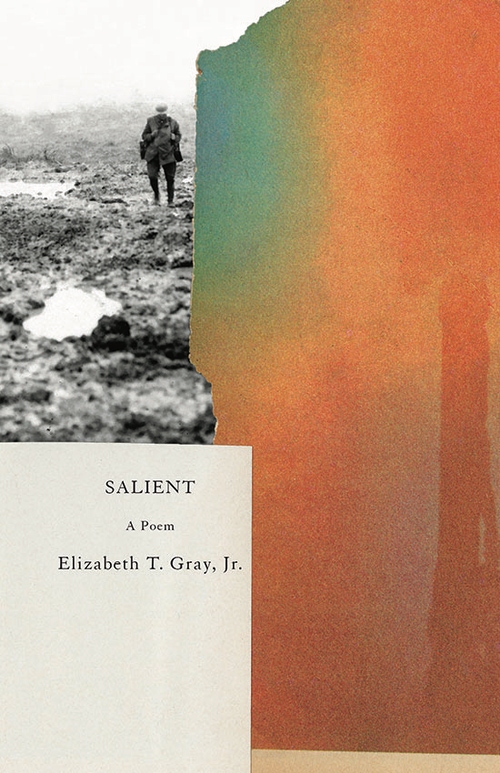In the foreword to her book-length poem Salient, Elizabeth Gray writes, “This work began by juxtaposing two obsessions of mine that took root in the late 1960s: the Battle of Passchendaele, fought by the British Army in Flanders in late 1917, and the chöd ritual, the core ‘severance’ practice of a lineage founded by Machik Lapdrön, the great twelfth-century female Tibetan Buddhist saint.” Over the course of several decades, Gray tracked the contours and traces of the Ypres Salient, walking the haunted battlefield ground of the contemporary landscape with campaign maps in hand, reading “not only history, poetry, and fiction, but also unit diaries; contemporary reports and individual accounts; survey information and maps of all kinds; treatises on aerial photography and artillery tactics; and manuals on field engineering and tactical planning.” Out of this material, through a process of collage, convergence, and ritual chöd visualization, Gray has composed a spare, fascinating, lyrical engagement with the Missing, in shell hole and curved trench, by way of amulets and obstacles. What is salient rises from the secret signs in song, like a blessing, protected from harm.
Salient
Reviews
“This extended poem is about how we comprehend and understand an event of mass slaughter that took place for limited military or political effect. There is no answer. We are left guessing why and what it means. In fact, our western, liberal, democratic traditions do not enable us to understand our own question. We have to look East, to Buddhist doctrine, to find a model that in any way serves this purpose…. Rather than seeking to answer the question, how was it? [Gray] asks us to consider how can we know?”
Fergus Smith
Journal of Veterans Studies
“Let me begin this review by stating unequivocally that Elizabeth Gray’s Salient is a masterpiece, by which I simply mean that it is a work of the utmost poetic accomplishment. Deeply rooted in modernism, especially in terms of technique, it is also one of the most original books of poetry I have encountered in quite some time. Perhaps above all, it is a work of the uncanny, a concept we associate more frequently with prose fiction or film rather than poetry….”
Norman Finkelstein
Poetry in Review
“An extraordinary book-length poem by Elizabeth T. Gray, Jr. that among other things finds deep poetic power in military documents from one of the supremely horrific battles of World War I.”
Geoffrey O’Brien
Bookshop
“Salient is a single-minded foray to find out where the hell you are, in the midst of a battle you can never fully see…Gray’s accomplishment is extraordinary. A vision floats up from the muck, a promise that can only ever be disclosed once we accept that all of life is a preparation for our own personal battlefield oblivion, our own interior Ypres….Salient finds the sacred, finds it and returns with it, from just past the outermost bounds of the known.”
Joseph Donahue
Hyperallergic
“Calling Salient ‘a book of poetry’ fails miserably to convey its emotional depth and punch. Adding the descriptor ‘original’ is essential, but still needs the addition of adverbs like uniquely, wonderfully, amazingly…but then I could be accused of gushing….’An exploration of a battlefield’ comes closer, but neglects to express just how delightfully the author is able to explore and document the fields of Ypres: through maps, military accounts, relics, sightings, feelings…of spirits, the dead, the missing. So what about ‘an epic’? Now we’re getting somewhere. There’s certainly something Homeric in Salient. A modern-day Iliad perhaps.”
Denzil Walton
Discovering Belgium
“By now, most of the poetry world has been alerted to and electrified by Salient…but this review is not for them. Rather, I speak here to my fellow general readers, in order to offer them sincere reassurance: you don’t need to be any scholar of poetry, you don’t even need to be particularly literarily-minded, to become immediately absorbed in and affected by Salient. It is a triumph accessible to, and intended for, any and all readers of poetry and literature, as well as of history, and military history. It simply works on every level…Salient is more than a ‘monumental’ or ‘brilliant’ achievement, then, though it is certainly all that. But it is also a doorway into a complex maze of horror, intimacy, the all-too real and the visionary; a maze that may seem forbidding, even terrifying, but that the reader is guided through, unalone, by a generous and accomplished hand. It is, in short, something wholly unique.”
Caleb Carr
War, Literature and the Arts (Editor’s Choice)
“The book attempts to pay a debt of a history, and yet those who must be paid are all dead. According to Buddhist texts, however, there are ways to reach them, to reach toward them, to find the lost ones. The book is an act of generosity. It is a hermetic book, but it is open. It provides guidance. I found in Salient something of a Whitman-like spirit. The poem will not let you go under. You may have to hold on with all your strength, but it is important that you make it across. The souls of so many dead in the lost terrain depend on your journey; and you, too, after all, are a soul in need.”
Jim Berger
The Harvard Review
